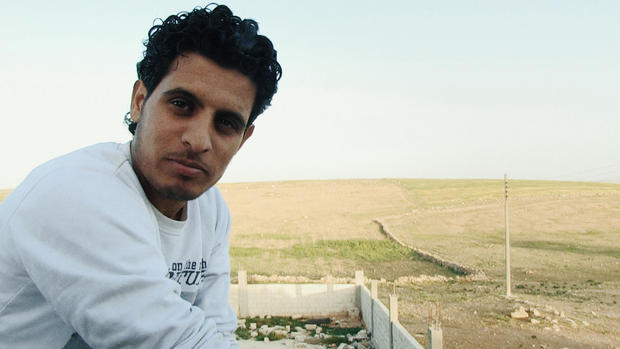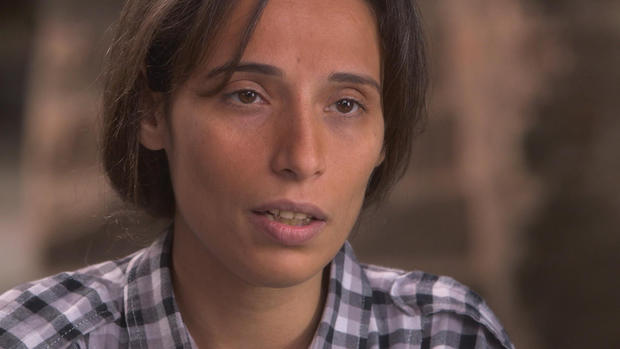Inside Homs
The following script is from "Inside Homs" which aired on Dec. 14, 2014. Bob Simon is the correspondent. Michael Gavshon and David Levine, producers.
Mention Syria today and most people will conjure up images of ISIS militants. But what has been a brutal and bloody civil war began almost four years ago as a peaceful struggle for basic freedoms. Since those early days, a small group of filmmakers has been documenting the country's descent into chaos. They've focused on the city of Homs, a cradle of the Syrian uprising and a place that has suffered more devastation than anywhere else in the country. The films paint a picture of the conflict that is more raw and revealing than anything you'll see on television news. And we warn you, some of what you're about to see is difficult to watch, but it's a reality millions of Syrians have to live with every day.
The film "Return to Homs" begins in the city streets in the heady days of the Arab Spring in 2011. After decades of oppression Syrians were rising up against the brutal dictatorship of Bashar al-Assad.
Learn more about the documentaries featured in this report by visiting the films' websites: "Return to Homs" and "Silvered Water"
The young man chanting is Abdul Basset al-Saroot, a charismatic 19-year-old star goalkeeper for the Syrian youth soccer team...a local hero.
"The age of oppression will end," he cries. "The people shall overcome."
Basset became the pied piper of the Homs uprising. He was the son of a poor blacksmith and his infectious charm inspired thousands to follow him.
Bob Simon: What was it about him that drew people towards him?
Talal Derki: The songs, his songs.
As soon as Talal Derki, the film's director, heard Basset in the streets of Homs, he knew he had found his subject. We spoke to Talal in Istanbul.
Bob Simon: He was 19 when you started--
Talal Derki: Yes, 19.
Bob Simon: --filming it. And he had no fear.
Talal Derki: No fear at all.
Like the day Basset stood above the crowd and started taunting the regime's snipers who had him in their crosshairs.
Talal Derki: He start to shout, "Listen, sniper, this is my head and this is my neck, that I am a clear target if you want to-- to-- to-- to-- to shoot me, but I will not be afraid."
The snipers didn't shoot Basset that day, but soon all across Syria, the regime began meeting the protestor's chants with bullets tanks and bombs. Makeshift field hospitals sprang up, in garages and storefronts.
Basset became a marked man but try as they might, they couldn't get him. So they took out his brother, his cousins, his friends.
Orwa Nyrabia: They were all killed in his own-- in-- in his family's apartment. It was a very difficult moment.
Orwa Nyrabia, the documentary's producer also filmed parts of it. We met him near the Syrian border in Turkey.
Orwa Nyrabia: So his mother was forced to make tea to the soldiers while they were killing her son. And that was moment when he said, "Peace is not going to work."
Basset was soon transformed from protester to armed revolutionary.
His small band of fighters began taking neighborhoods controlled by the regime. Assad's soldiers struck back slaughtering thousands. Every funeral prompted more fury.
Homs, Syria's third-largest city, started to look like something out of World War II or worse. And all that time, the cameras were right there with Basset and his men, capturing everything.
They were with him when he saw what was left of his old apartment.
"This is Homs," he says, "but I don't know where I am."
Still Basset never forgot how to laugh.
"Do you think I'll have time to shave before I die?" he asks. "Maybe we'll find a barber at the battlefront. Let's hope he's good."
He was always leading from the front, but losing men every day. And when it came to burying them, even the cemetery was a target. Basset was exhausted, demoralized, desperate.
The city was besieged for two years. Basset was shot three times...each time, he returned to the fight.
The last battle in the film was the fiercest and when he was shot this time, it left him pleading to become a martyr, begging Allah to take him away.
He survived, but his few remaining fighters were starving and running out of ammunition. So when the U.N. brokered a ceasefire last spring, they left the city, along with Homs' remaining residents. They had pleaded with the West for help, but none ever came. And according to Orwa Nyrabia, Basset and his men turned to the Islamists. It was happening all over the country.
Bob Simon: Basset starts out, in the film we see him, this football player. He seems like a pretty secular guy.
Orwa Nyrabia: He was.
Bob Simon: And then in the course of the film we see him turn in to Islam.
["If you have this dream of defending your city you need money. You need food. And you need weapons or ammunition. You can be--"]
Bob Simon: And it wasn't coming from anywhere.
Orwa Nyrabia: You have to get it from somewhere. And if it comes with a few conditions then you'll have to adapt.
Bob Simon: So the choice was between Islam or nothing.
Orwa Nyrabia: Entirely.
There were long periods when Orwa didn't think they could finish the film at all. Just getting cameras past army checkpoints and getting film out was becoming increasingly risky. Eventually, it became so dangerous that they had to flee the country.
They continued making the film remotely...using Skype to train Basset's men to use the cameras. It was a new way of making films and it worked!
Orwa would go even further in exposing the horrors of Homs in his next film, " Silvered Water." It weaves together grainy cell phone footage that Syrians had been uploading onto YouTube. He made the film with Syrian director Ossama Mohammed, who was in exile in Paris.
Ossama Mohammed: I felt that the tragedy of Syrian people written by the Syrians themself, filmed by the Syrians themself, it can build a extraordinary film.
In this video, taken inside an interrogation room, a teenage boy is seen cowering in a corner, then forced to kiss the foot of his torturer, then badly beaten.
But who could have gotten into an interrogation room with a camera? Ossama says that the soldiers filmed these scenes themselves, then put them on the Internet as a warning. Stop protesting or else...
Ossama Mohammed: When you are beating a young boy you are telling everybody that if you want freedom, if you will demonstrate, you will be in his place in the next sequence.
One day, as he was putting all this together, he received a message on Facebook. It was from a young Kurdish woman named Simav who was suffering through the siege of Homs. She had a video camera and wanted to use it. She asked Ossama: "If you were in my position, what would you film?" "Everything," he wrote back.
Bob Simon: Did you feel that you were his eyes?
Simav: I was also his heart, his hands, and his soul. Not only for him, but for all Syrians who were far away.
For two and a half years, she filmed, capturing the terror experienced by Syrians every day. And not just the people...
The film showed the lengths to which Syrians went to defy the snipers and leave no man behind. Simav used her cellphone to send Ossama her videos, sometimes it took days to upload a single clip. When he didn't hear from her, he feared the worst.
Bob Simon: Were you afraid for her?
Ossama Mohammed: Of course. I was crying a lot of time. I was sitting in Paris and crying.
But for Simav just staying alive during the siege was a battle. There was no electricity, no running water, no food.
Simav: I remember on my third day without food, I was ready to collapse. I walked into an abandoned house, into the kitchen.
Simav: There were sugar containers and I started licking them like a wild animal. Then after that, we started eating grass and tree leaves.
Bob Simon: You were eating grass?
Simav: It was delicious. I would go out looking for grass because our days were full of shelling and hunger and frustration. I would try to look at it in a positive way, to forget the pain. Sometimes, the only way to go on living is to forget.
To help the children of Homs forget, Simav opened a school. She tried to make the kids laugh. When children didn't show up for class, she knew what it meant.
["Yassim and Miriam... Miriam and Yassim"]
Simav: Like so many other things in this war, I didn't want to believe that they were actually under the ground. I often imagined myself telling them: "Stop this cruel joke. You can't possibly be dead. Death does not take away such young children." But it wasn't a joke.
Bob Simon: How did the children make sense of what was happening?
Simav: They didn't make sense of it. The children got used to death the same way they were used to life. For children in Syria, death has become just as normal as life. Difficult, but normal.
One little boy in her class named Omar knew that all too well. He'd lost his father in the siege.
"How are you, Papa?" The boy asks at his father's graveside... I miss you... I brought you the nicest roses to make you happy...
Like all the children in the siege, the battered streets of Homs were Omar's playground... He knew his way around.
There's a sniper that way , he says,
And remember after all, he's a four year-old boy.
Do I have to run with all my toys? He asks...
Omar got out of Homs...but is now in another town under siege. Simav got out too.
Bob Simon: What was more important to you during the days you were filming: Saving your life or saving your camera?
Simav: The camera. Of course, the camera.
Bob Simon: Of course, the camera?
Simav: Without any hesitation, my camera and everything I've filmed are more valuable than my life. Because if the camera survives someone else can always continue the work.
Simav is now in Turkey, but is determined to go back to Syria as soon as she can. And Basset, the soccer player-turned revolutionary? He and a new band of rebels are near Homs, still fighting the Assad regime.
"Return to Homs" (now available on iTunes) courtesy of Proaction Film, Ventana Film and Journeyman Pictures
"Silvered Water" courtesy of Proaction Film, Les Film's d'Ici and Doc & Film International


